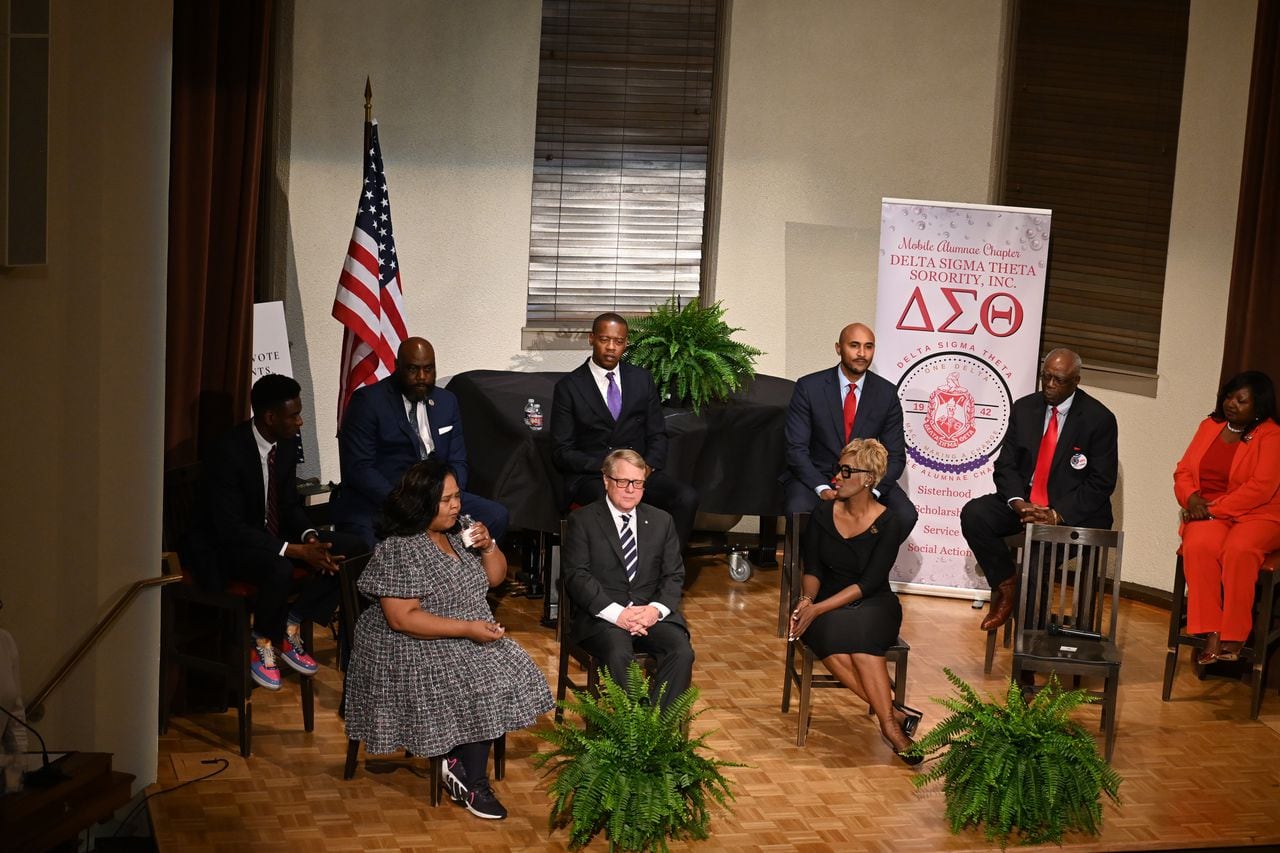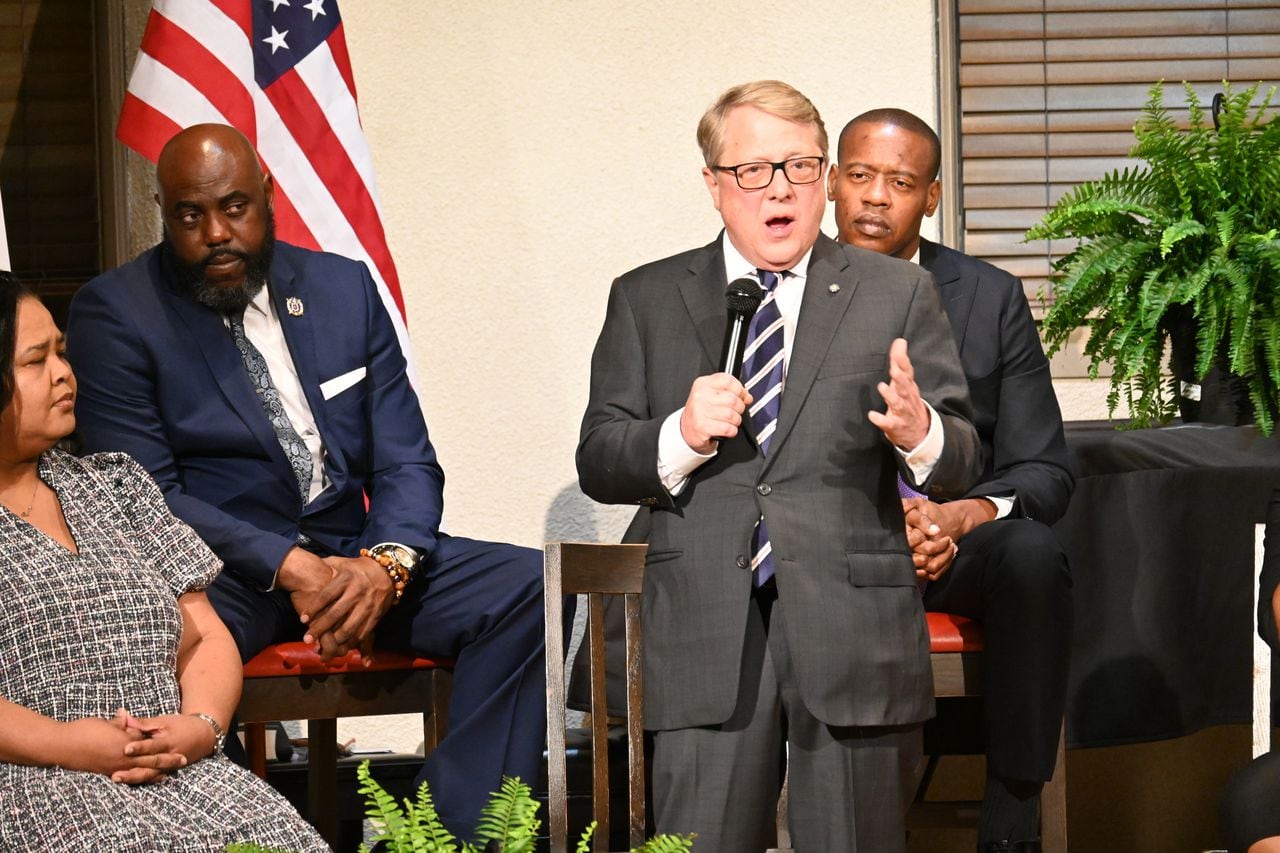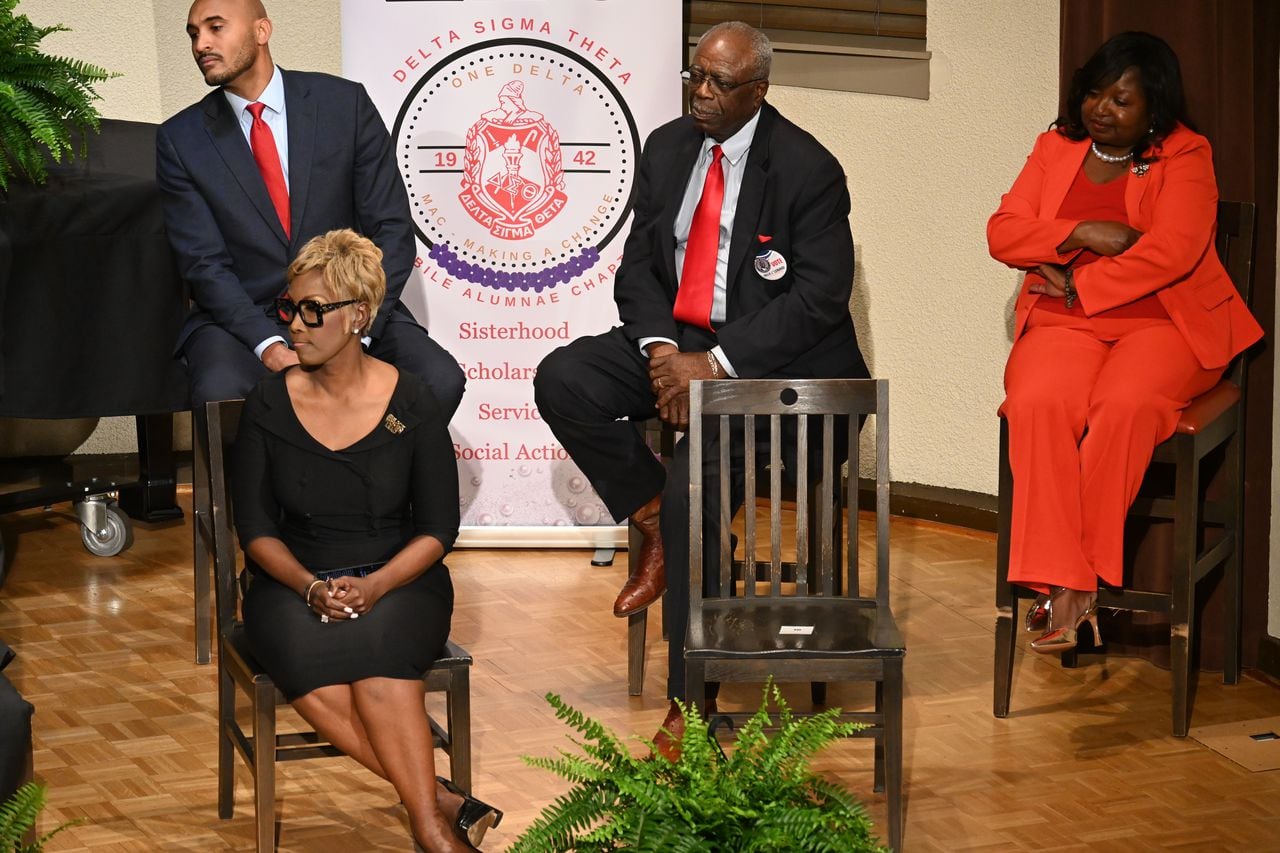Why an Alabama congressional candidate did not participate in a forum he attended
Nine candidates in the Alabama congressional district 2 race gave their thoughts on education policy, gun control, election reform, residency, school safety, and more during a candidates’ forum Thursday in Mobile.
But the story underscoring the event dubbed a “Conversations with the Candidates,” was the fact that one of the candidates was not allowed on stage five days before a high-stakes primary election that could play a significant factor in which political party takes charge of the U.S. House after November.
State Rep. Napoleon Bracy, a Democratic lawmaker from Mobile County, sat in the audience as an observer, disqualified from participating because one of the forum’s organizing groups claimed he did not submit an RSVP before a deadline.
Though polling in the race has been limited, one released in December by the Southern Poverty Law Center Action Fund showed Bracy in the lead, though nearly half of the electorate was undecided. He also has the endorsement of the influential Alabama Democratic Conference, a predominately Black caucus led by longtime Alabama Democratic Party head Joe Reed.
“There were a lot of whispers in the room tonight wanting to know what was going on,” said Bracy. “All of the polling data comes out and it shows I’m one of the top candidates in the election. I think it’s a shame that one of the top candidates is sitting in the audience and an open seat was at the table.”
RSVP concerns
An empty chair on the stage of the Bernheim Hall inside the Ben May Library in Mobile, Ala., during a congressional district 2 forum that was held on Thursday, Feb. 29, 2024.John Sharp/[email protected]
Bracy sat in the second row of Bernheim Hall inside the Ben May Library in downtown Mobile while a group of seven Democrats and two Republicans fielded questions from two moderators. An empty chair was on stage.
Kiwana Brooks, who is in charge of political awareness and involvement with the Mobile Alumnae Chapter of Delta Sigma Theat Sorority, said there should have been more than just one chair on the stage to represent the three candidates who she said RSVP’d to participate, but were unable to attend – State Sens. Greg Albritton and Merika Coleman, who were both in Montgomery for official state duties during the legislative session, and Vimal Patel, who was unable to attend.
Brooks said the debate hosts could not accommodate Bracy because he did not RSVP before a deadline.
“We were not able to accommodate anymore participates after the deadline,” Brooks said. “The RSVP date was there to accommodate all participants.”
Bracy told the local media after the forum that he submitted his RSVP on Feb. 22, exactly one week before the debate and ahead of what he said was the deadline. It was unclear on the exact RSVP date.
Bracy said he initially balked at participating out of concerns that participants with the event’s original host organizers was affiliated with one of his opponent’s campaigns. He declined to name the organization.
“When one of the original organizers of the forum reached out, I felt some bias,” Bracy said. “Like anything we participate in, I wanted to make sure it was a fair situation we were walking into. I brought (the political connection) to the organizers, and they restructured and brought in other groups to participate.”
Bracy said that once he learned the forum had been restructured, he reached back out to the organizers last week. The forum’s hosts included the Mobile Alumnae Chapter of Delta Sigma Theta Sorority, the Mobile chapter of the League of Women Voters, the Greater Mobile Alabama Chapter of the Links Incorporated, and Mobile United.
“I responded to that because of ‘space and time constraints,’ I would not be able to participate in the forum,” Bracy said. “But as you can see, there is an empty chair there. Three candidates did not show up. It wasn’t even acknowledged that I was present.”
He said he suspects someone who was with the forum’s organizers might have been upset with him for expressing initial concerns about one of the group’s members affiliation with one of the participating candidates.
Brooks said that wasn’t the case, adding that Bracy’s lack of involvement was a matter of fairness to the other candidates.
“There were multiple guidelines set,” she said. “To make sure we were fair to all the candidates, we wanted to make sure all of those guidelines were followed. That’s all I can speak on with regard to Bracy.”
Democrat participants

Some of the candidates who will appear on the March 5, 2024, primary ballot in the Alabama congressional district 2 race appear on the stage of Bernheim Hall inside the Ben May Library during a forum on Thursday, Feb. 29, 2024.John Sharp/[email protected]
The forum, aside from Bracy’s lack of involvement, featured few fireworks despite the closeness of the primary election day and the high-stakes at play: Democrats are looking to pick up a seat long held by Republicans at a time when the GOP has a razor-thing 219-213 majority in the House. Among the competitive races being charted by Cook Political Report, the 2nd district in Alabama is listed as “likely Democrat.”
The race is possible because of Allen v. Milligan, the federal case that led to a surprising U.S. Supreme Court ruling in June that the Alabama Legislature’s congressional map violated Section 2 of the Voting Rights Act and had to be redrawn.
A federal court approved a new Alabama Congressional District 2 as part of a new congressional map in October. The district radically shifted from a safe Republican district to one where voters could elect the second Democrat and second Black representative in Alabama’s seven-member Congressional delegation.
The district includes cities like Mobile and Montgomery, as well a host of rural counties through Alabama’s Black Belt region.
Some of the candidates, including House Minority Leader Anthony Daniels and former U.S. Department of Justice official Shomari Figures, drew upon connections to Mobile. Daniels, a Huntsville Democrat criticized by other candidates for a lack of residency to the 2nd district, touted his support as a state lawmaker in 2016, of diverting more BP oil spill settlement money to Mobile and Baldwin counties. Figures — son to state Sen. Vivian Figures and the late former Sen. Michael Figures – said he intended to “give back where I came from” if he’s elected to Congress.
Figures, asked about the 2020 election, said he felt claims that undermined President Joe Biden’s victory “do nothing but undermine the security of our nation and the security of our democracy as a whole.”
Other candidates expressed concerns about the future of democracy.
State Rep. Juandalynn Givan, D-Birmingham, said in her opening remarks that “democracy is under attack,” and that voting rights are also under attack. She also raised concerns about restrictions to teaching Black history in schools, saying that Republicans are attempting to “strip away Black history, a history that deserves to be told here in the United States.”
“I support any effort to keep history, whether it’s Black history or (Native American) history or whoever’s history,” she said. “But to take away history from a race of people … it’s unacceptable. I won’t support it.”
Daniels and State Rep. Jeremy Gray, D-Opelika, weighed in on labor relations with Daniels saying there was a place for labor unions to co-exist more with corporate America. Gray said there was a greater need for unionized businesses to boost low pay in rural counties where the median average annual salaries are considerably lower than the state’s average.
Two recent Democratic congressional candidates also made their pitches.
James Averhart, a U.S. Marine Corps veteran from Mobile, and current executive director of the Alabama State Conference of the NAACP, made an emphatic closing statement to say he was the Democratic nominee for Congress in 2020 – in the 1st congressional district race, which he lost to Republican Jerry Carl – and that he’s “gotten smarter” and more involved.
Phyllis Harvey-Hall, a career educator who twice rain against Republican U.S. Rep. Barry Moore in the 2nd district in 2020 and 2022, said she wants to advocate for women’s rights, and more pay equality adding that “we have to make sure we all have a portion of the American pie.”
Willie Lenard, a retired businessman, made perhaps the boldest of all vows by saying he would make sure he secured $8 billion in federal money “to rebuild roads and bridges” throughout the district.
“We’ve waited 159 years for this opportunity,” he said. “We must send someone to Congress who must represent us.”
Republican viewpoints

State Sen. Dick Brewbaker, R-Montgomery, speaks during an Alabama congressional district 2 candidates’ forum on Thursday, Feb. 29, 2024, inside the Bernheim Hall at the Ben May Library in downtown Mobile, Ala.John Sharp/[email protected]
Two Republicans participated in the event including former State Sen. Dick Brewbaker of Montgomery, who said he supported arming school personnel who were trained in active shooter situations. He said that a school’s tax base could erode if students and their parents do not feel comfortable with a school.
“If kids aren’t safe, parents will find alternatives,” Brewbaker said. “As students leave, does the tax base.”
He added, “Having armed people in schools? Yes. Untrained people? No. But I do believe armed people should be on campus in case of an incident.”
Republican Stacy Shepperson of Washington County weighed in on residency concerns within the race, saying that she is uncertain how anyone can represent the congressional district if they do not live within it.
“By working in Mobile, I know what is needed,” she said. “I’ve worked throughout this area and I am very familiar and engaged with it. I don’t know how you can effectively work in a district if you don’t know it.”
The Republican candidates who did not RSVP or attend the forum, but who will the ballot next week, included Caroleene Dobson, Karla DuPriest, Hampton Harris and Belinda Thomas.
